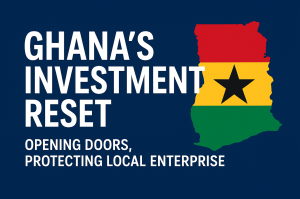Business
Scrapping minimum capital requirements for foreign investors: Opportunity or Risk?
By: Prince Kojo TABIRI Esq Ghana plans to review its Investment Promotion framework through an amended GIPC Act. President John Dramani Mahama unveiled this reform at the Presidential Investment Forum in Japan on Wednesday, August 20th, 2025. The plan is to scrap the minimum capital requirement f...
B&FT
published: Aug 28, 2025

By: Prince Kojo TABIRI Esq
Ghana plans to review its Investment Promotion framework through an amended GIPC Act. President John Dramani Mahama unveiled this reform at the Presidential Investment Forum in Japan on Wednesday, August 20th, 2025.
The plan is to scrap the minimum capital requirement for foreign investors. Big move, but it carries both opportunities and risks for the Ghanaian Market.
Minimum capital requirements were originally meant to shield local SMEs from being undercut; ensure serious, long-term investment; encourage capital-intensive, value-adding sectors; and to balance foreign inflows with domestic livelihoods.
Ghana therefore used minimum capital as a protective legal tool to “ring-fence” petty trading and encourage higher-value Foreign Direct Investment.
Scrapping the minimum capital however, makes Ghana more attractive for startups, SMEs, and innovative sectors like fintech & e-commerce. It aligns with modern open investment models and Ghana’s 24-hour economy initiative.
The risk here is, local traders, especially in retail trading, may feel threatened by unfair foreign competition (with foreign investors or traders already encroaching locally reserved business spaces). Without safeguards, tensions can rise.
For example, South Africa’s xenophobic tensions, particularly targeting African and Asian migrants, often stem from competition in the informal and retail trade sector. Many migrant entrepreneurs (e.g. from Somalia, Ethiopia, Pakistan, Nigeria) operate spaza shops and small-scale retail outlets in townships.
Unlike Ghana, where the GIPC Act explicitly reserved small-scale retail for nationals through minimum capital thresholds, South Africa did not legislate such restrictions. It operates an open investment model. The absence of such barriers fueled perceptions among some South Africans that foreign traders undercut locals, increasing tensions and occasionally sparking violent xenophobic attacks.
Two Key safeguards to avoid such mistakes:
- Clearly define and ENFORCE citizen-only trading activities (hawking, petty retail, operating a provisions store, operating a taxi service* etc). Retain, clarify, and actively enforce the activities already reserved to Ghanaian citizens.
- Ensure local equity participation. For foreign‑owned trading companies that are not within the reserved list, govt should require at least one of the following: local equity participation, local store‑manager certification, or local supplier quotas above a transparent threshold. Strict foreign investment with local participation.
Open Investment, Strong Safeguards: Ghana’s Next Chapter?
The Bottom line is, as we await the investment reform (ie. the new GIPC Act); Ghana can modernize its investment climate while protecting local enterprises. Open investment plus smart safeguards create economic growth and social stability. Ghana is Open for Business and soon, there will be no more capital barriers.

The post Scrapping minimum capital requirements for foreign investors: Opportunity or Risk? appeared first on The Business & Financial Times.
Read More